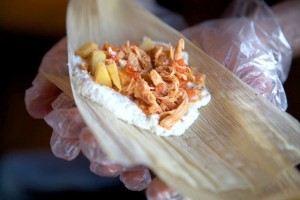Panel presents fresh ideas for a healthier future
“Everyone eats,” said Sue Tyson, an archivist at the special collections department of the USC Libraries, when asked why people should care about access to essential nutrition.

Fresh and easy · Food from Mama’s Hot Tamales Café will be served at the event. Access to fresh and local foods can be a challenge in many communities. The panel, held Friday, will examine the reasons behind the issue. — Courtesy of Eve NaRanong
To hear Tyson tell it, food security should be at the forefront of the public consciousness. And to help promote the issue, Tyson, together with friend Chimene Tucker — a librarian at Doheny Memorial Library — have coordinated the upcoming Visions and Voices event “Just Food and Fair Food: A Multidisciplinary Exploration.”
The event, which takes place Friday, will hit at one of the core problems facing the world today: ensuring that everyone can eat healthily and affordably. Paula Daniels, senior advisor to the mayor of Los Angeles on sustainable food and water policy will moderate the conversation.
Following the panel, students can get free food and converse at a fair-food bazaar featuring cuisine from sustainable restaurants in Los Angeles such as Mama’s Hot Tamales, which is near MacArthur Park, and Homegirl Café in Chinatown.
As Tucker noted, healthy and fresh food is a big challenge in urban environments, particularly those that are economically depressed.
“[If] the only place you can get produce is at a corner bodega or a 99 cent only store … where is that produce coming from, how long has it been there?” Tucker asked.
The food you might find there is often low-quality at best. Chips and sodas are much easier to stock than fresh fruits and veggies at a corner mart, so finding good food can be a challenge in the inner city.
More importantly, the lack of healthy, affordable food creates numerous problems.
“What about obesity? What about health care costs? What about those other costs for cheap food?” Tyson said.
But the problems are not just contained to inner-city markets. Too often, food sold to American consumers is not locally produced to save on costs. That can create environmental harms and reduce the quality of the produce.
Tucker noticed the problem when she went to pick up produce at a local grocer and wondered about some of the items in her basket.
“Why am I getting cucumbers from Jamaica? I thought, ‘Really, from Jamaica?’” Tucker said.
Jamaican cucumbers might be cheaper than California-grown ones, but shipping produce across borders reduces the quality of the food and has a greater environmental impact. Thus, consumers who want to eat well and inexpensively are caught between expensive local produce and poor quality food.
Addressing these problems will require multiple approaches — food security is a multidisciplinary issue. For this reason, Tucker and Tyson have teamed up to bring a panel of food experts, policy makers, local activists and experienced chefs together to discuss the matter.
Following the panel discussion, the panelists and the audience will eat a catered lunch together, giving students and experts more time to interact and discuss the issues. The lunch promises to be a great opportunity to see firsthand how talented local chefs turn ordinary ingredients into wonderful meals.
Unfortunately, for many in Los Angeles, the kind of cooking that USC students can experience at the panel is a rarity. Tucker said that she thinks students should care more about the food they are consuming.
“Students at USC, now that they are at USC, have to think about food in a completely different way,” Tucker said. “Food is a completely different thought.”
USC students become interested in changing the system, there is much that can be done with existing resources on campus. Both Tucker and Tyson are full of ideas about creating rooftop gardens, hosting cooking classes, exploring the economic disparities that lead to food deserts, engineering new methods of transportation to move fresh food around the world, experimenting with soil composition to grow better food more efficiently and influencing policy makers to change the system.
Overwhelming evidence suggests the food system in this country and in the world today is broken. The conversation on Friday will look at solving some of those problems and, according to Tucker, “may gear toward completely changing the system.”
There is much for activists to do, and Tucker is optimistic:
“The sky is the limit.”
